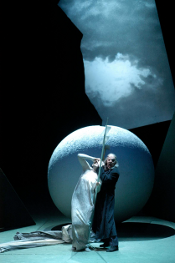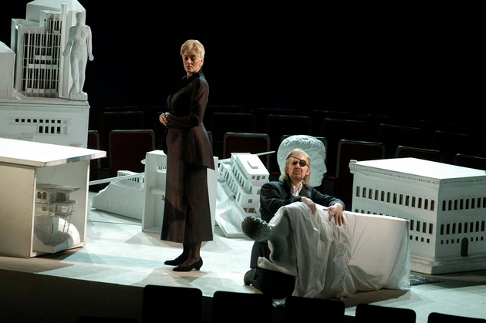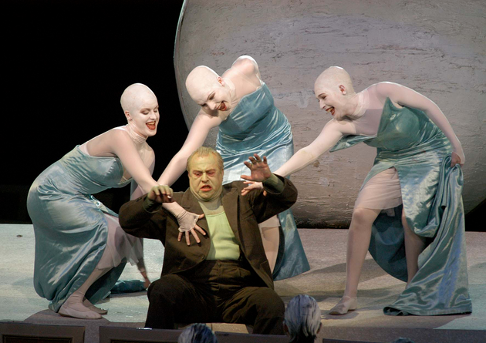![Scene from Götterdämmerung [Photo by Matthias Creutziger courtesy of Sächsische Staatsoper Dresden]](http://www.operatoday.com/03075f7399.png)
22 Mar 2010
Changing conductors bring color to Dresden Ring
It was a bit of intrigue that recalled the Wagners at home back in Bayreuth’s Haus Wahnfried.
English Touring Opera are delighted to announce a season of lyric monodramas to tour nationally from October to December. The season features music for solo singer and piano by Argento, Britten, Tippett and Shostakovich with a bold and inventive approach to making opera during social distancing.
This tenth of ten Live from London concerts was in fact a recorded live performance from California. It was no less enjoyable for that, and it was also uplifting to learn that this wasn’t in fact the ‘last’ LfL event that we will be able to enjoy, courtesy of VOCES8 and their fellow vocal ensembles (more below …).
Ever since Wigmore Hall announced their superb series of autumn concerts, all streamed live and available free of charge, I’d been looking forward to this song recital by Ian Bostridge and Imogen Cooper.
The Sixteen continues its exploration of Henry Purcell’s Welcome Songs for Charles II. As with Robert King’s pioneering Purcell series begun over thirty years ago for Hyperion, Harry Christophers is recording two Welcome Songs per disc.
Although Stile Antico’s programme article for their Live from London recital introduced their selection from the many treasures of the English Renaissance in the context of the theological debates and upheavals of the Tudor and Elizabethan years, their performance was more evocative of private chamber music than of public liturgy.
In February this year, Albanian soprano Ermonela Jaho made a highly lauded debut recital at Wigmore Hall - a concert which both celebrated Opera Rara’s 50th anniversary and honoured the career of the Italian soprano Rosina Storchio (1872-1945), the star of verismo who created the title roles in Leoncavallo’s La bohème and Zazà, Mascagni’s Lodoletta and Puccini’s Madama Butterfly.
Evidently, face masks don’t stifle appreciative “Bravo!”s. And, reducing audience numbers doesn’t lower the volume of such acclamations. For, the audience at Wigmore Hall gave soprano Elizabeth Llewellyn and pianist Simon Lepper a greatly deserved warm reception and hearty response following this lunchtime recital of late-Romantic song.
Collapsology. Or, perhaps we should use the French word ‘Collapsologie’ because this is a transdisciplinary idea pretty much advocated by a series of French theorists - and apparently, mostly French theorists. It in essence focuses on the imminent collapse of modern society and all its layers - a series of escalating crises on a global scale: environmental, economic, geopolitical, governmental; the list is extensive.
For this week’s Live from London vocal recital we moved from the home of VOCES8, St Anne and St Agnes in the City of London, to Kings Place, where The Sixteen - who have been associate artists at the venue for some time - presented a programme of music and words bound together by the theme of ‘reflection’.
'Such is your divine Disposation that both you excellently understand, and royally entertaine the Exercise of Musicke.’
Amongst an avalanche of new Mahler recordings appearing at the moment (Das Lied von der Erde seems to be the most favoured, with three) this 1991 Mahler Second from the 2nd Kassel MahlerFest is one of the more interesting releases.
‘And there was war in heaven: Michael and his angels fought against the dragon; and the dragon fought and his angels, And prevailed not; neither was their place found any more in heaven … that old serpent … Satan, which deceiveth the whole world: he was cast out into the earth, and his angels were cast out with him.’
If there is one myth, it seems believed by some people today, that probably needs shattering it is that post-war recordings or performances of Wagner operas were always of exceptional quality. This 1949 Hamburg Tristan und Isolde is one of those recordings - though quite who is to blame for its many problems takes quite some unearthing.
There was never any doubt that the fifth of the twelve Met Stars Live in Concert broadcasts was going to be a palpably intense and vivid event, as well as a musically stunning and theatrically enervating experience.
‘Love’ was the theme for this Live from London performance by Apollo5. Given the complexity and diversity of that human emotion, and Apollo5’s reputation for versatility and diverse repertoire, ranging from Renaissance choral music to jazz, from contemporary classical works to popular song, it was no surprise that their programme spanned 500 years and several musical styles.
The Academy of St Martin in the Fields have titled their autumn series of eight concerts - which are taking place at 5pm and 7.30pm on two Saturdays each month at their home venue in Trafalgar Square, and being filmed for streaming the following Thursday - ‘re:connect’.
The London Symphony Orchestra opened their Autumn 2020 season with a homage to Oliver Knussen, who died at the age of 66 in July 2018. The programme traced a national musical lineage through the twentieth century, from Britten to Knussen, on to Mark-Anthony Turnage, and entwining the LSO and Rattle too.
With the Live from London digital vocal festival entering the second half of the series, the festival’s host, VOCES8, returned to their home at St Annes and St Agnes in the City of London to present a sequence of ‘Choral Dances’ - vocal music inspired by dance, embracing diverse genres from the Renaissance madrigal to swing jazz.
Just a few unison string wriggles from the opening of Mozart’s overture to Le nozze di Figaro are enough to make any opera-lover perch on the edge of their seat, in excited anticipation of the drama in music to come, so there could be no other curtain-raiser for this Gala Concert at the Royal Opera House, the latest instalment from ‘their House’ to ‘our houses’.
"Before the ending of the day, creator of all things, we pray that, with your accustomed mercy, you may watch over us."
![Scene from Götterdämmerung [Photo by Matthias Creutziger courtesy of Sächsische Staatsoper Dresden]](http://www.operatoday.com/03075f7399.png)
It was a bit of intrigue that recalled the Wagners at home back in Bayreuth’s Haus Wahnfried.
Fabio Luisi, music director of Dresden’s Semper Opera with a contract that was to run through the 2010-2011 season, was slated to conduct two spring cycles of Wagner’s Ring des Nibelungen with the company.
In February, however, Semper administrators signed a contract with German television for a New Year’s Eve concert by the Saxon State Orchestra, the pit band at the Semper Opera. Conductor will be Christian Thielemann, already named to succeed Luisi in Dresden in 2012. Luisi, told nothing about the contract, was understandably miffed and resigned his Dresden position — including the Ring engagement — immediately. This left the opera with less than a month to find replacement conductors the Wagner cycles. Scene from Siegfried
Scene from Siegfried
In a world poor in great Wagnerians, the Opera did amazingly well by engaging several maestros, each of whom brought his particular stamp to the performances. Jonas Alber, who has conducted numerous Ring cycles at lesser houses, stepped in on short notice for the March 10 Rheingold, the opening opera of the tetralogy.
With the Saxon State Orchestra at his disposal, of course, Alber could hardly do anything wrong. Dating back to 1548, it is Germany’s oldest orchestra and among opera ensembles without its equal. Alber proved himself an experienced craftsman who brought coherence to the fragmented drama that Rheingold is.
Things moved in quite another direction when John Fiore took over the podium for Walküre. The still-youthful American, now at home at Germany’s Deutsche Oper am Rhein, the joint venture that serves both Düsseldorf and Duisberg, is a passionate conductor who brought vivid animation to the tangled passions of the chapter of the story focused on the incestuous love match of twins Sieglinde and Siegmund.
 Scene from Die Walküre
Scene from Die Walküre
Next in line was Israel’s Ascher Fisch, who although not allowed to conduct Wagner in his homeland, has built a reputation as a major interpreter of his works in other countries. (Fisch conducts the new Tristan slated for Seattle in August.)
Alber returned to go beyond himself in making the final Götterdämmerung on March 17 overwhelming.
Watching the 100-plus musicians of the Saxon orchestra from the balcony in the fury of Act Three of the opera made clear that when Wagner is on stage in Dresden the ensemble is simply a member of the cast. The impassioned involvement experienced here — four harps, eight horns! — confirmed the world-class quality of the Semper Opera, currently celebrating its 25th season in the rebuilt historic house reduced — like the rest of Dresden — to ruins in the night of February 13, 1945.
 Scene from Das Rheingold
Scene from Das Rheingold
This Ring is further the first complete staging of the cycle in Dresden since World War Two. (In the earlier spring Ring Fisch conducted both Siegfried and Götterdämmerung.)
Wes Blomster